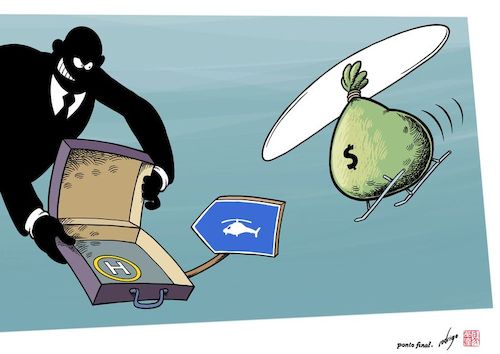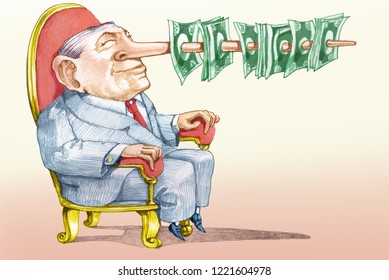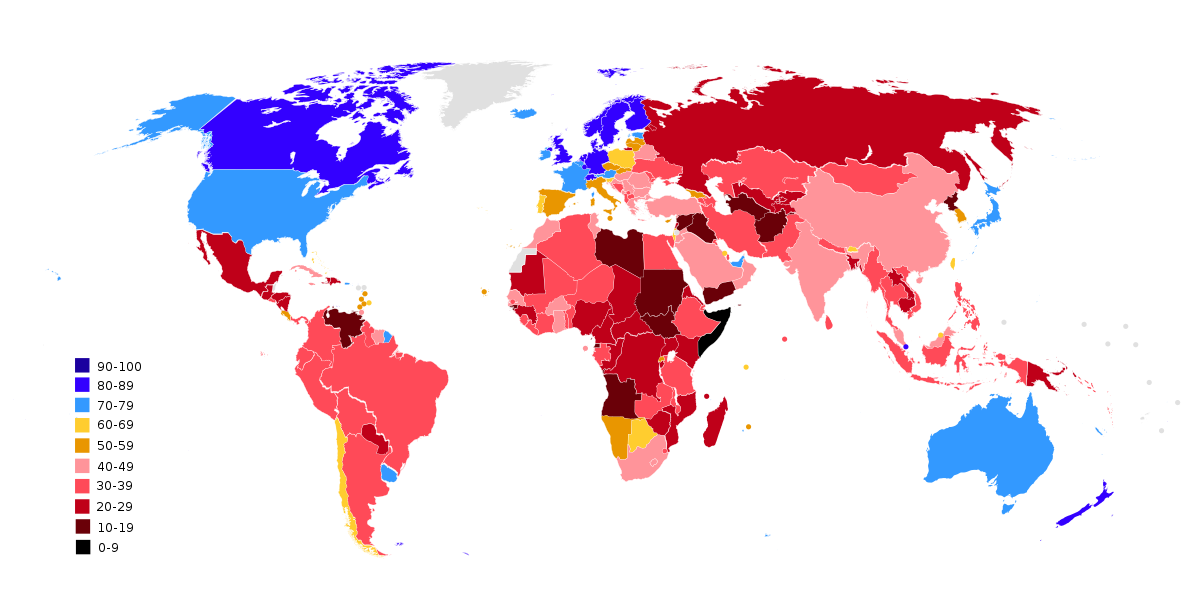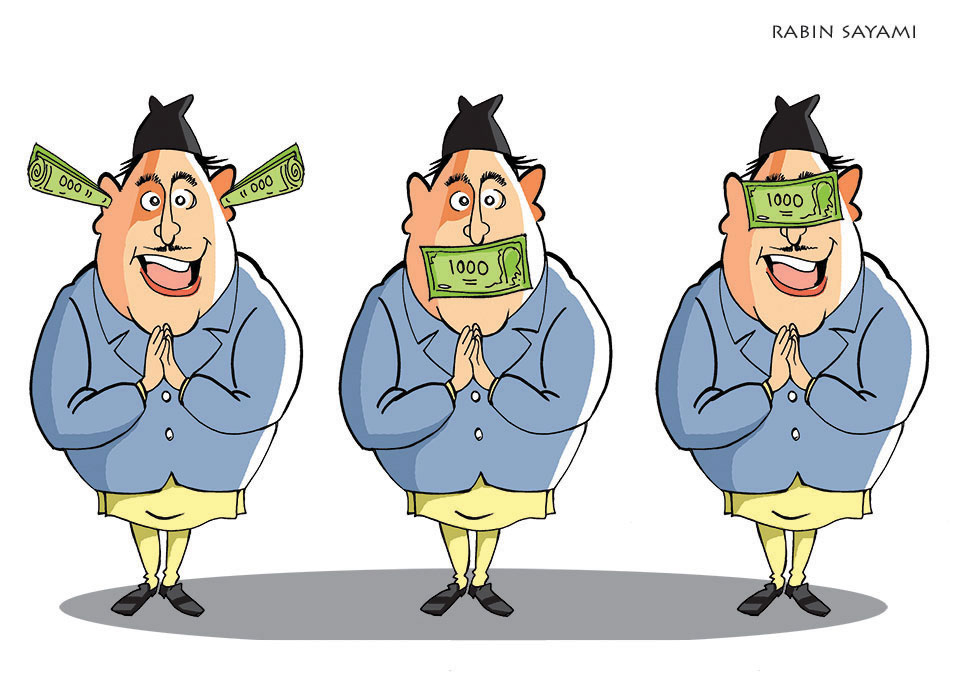Corruption In Nepal: An Anthropological Inquiry For at least a decade and more obtrusively in recent years, the problem of corruption has been at the center of the political agenda in Nepal. It is recognized as one of the chief causes of Nepal’s underdevelopment. It is very widespread, has different manifestations, and is practiced at all levels of society. The Nepali bureaucracy, politician, and the business sector are most seriously affected by, and inextricably involved in corruption. This is really a great challenge to the campaign of modern Nepal. The businesspersons, the politicians, government officials, so called academicians and even consumers are responsible for this. ....... Corruption is a complex and multifaceted phenomena with multiple causes and effects, as it takes on various forms and functions in different contexts. The phenomenon of corruption ranges from single act of activity contradicted by law to way of life of an individuals or groups. The definition of corruption ranges from the broad terms of 'misuse of power and authority' to 'moral decay' ............ Corruption is conventionally understood, and referred to, as private wealth-seeking behavior of someone who represents the state and public authority. It is the misuse of public goods by public officials, for private gains. In simple terms corruption may be described as “an act of bribery” or “the use of public power for private profits in a way that constitutes a breach of law or a deviation from the norms of society .......... Multinationals are, for instance, buying concessions, preferences and monopolies; kickbacks are offered on tenders, loans and contracts, and development projects are sometimes eased through by including travels, computers, and other fringe benefits for officials ...... There is no question that corruption is, before anything, a type of crime ........... At the national institutional level, corruption takes place between the government (the executive) and the administrative and bureaucratic institutions (the civil service, judiciary, legislature, and local authorities). The relationship can be corrupted because of overlapping and conflicting authority, political power struggles over access to scarce resources, and personal relationship of dependence and loyalty. Other contributing factors are, a weak separation between civil service and partisan politics, a weak professionalization of the bureaucracy, a lack of accountability and transparency, and deficient political control and auditing.
The more discretion officials have through abundant, complex and non-transparent regulations, the more corruption becomes likely
............. Corruption, however, also exists within and between private businesses and within non-governmental organizations, without any state agency or state official being involved. There is a corruption in terms of bribing, swindling and mafia methods in business, and there are treacherous individuals and disloyal employees in many private firms, organizations and associations. Besides, corruption also exists as a moral and cultural problem in society, among individuals in their personal dealings. ............ By “greasing palms” corporations and businesses interests can buy, for instance, political favors and escape the full burden of taxation and environmental regulation, or buy protected market and monopolies, import/export licenses etc. Bribery can also be a form of “informal” taxation, when public officials charge additional amount under-the-table payments (called ghush in Nepali) or expected “gifts” from clients. ............... Embezzlement happens when a state official steals goods and resources from the public institution in which he/she is employed, and from resources he is supposed to administer on behalf of the state and the public ................. Embezzlement is regarded as theft because it does not involve the “civilian” side directly ........ In Nepal, embezzlement is one of the most important modes of economic accumulation. In fact political leaders and higher administrative bureaucrats are earning money by this method. Otherwise, how is it possible to earn multi million rupees within a few years of bureaucratic post or being a political authority? It is a fundamental part of the resource extractive capacity of the ruling elite, and it should be taken more seriously than extraction through bribes. ............... Another form of embezzlement is - some power holders systematically use their political office to enter into, secure and expand their private business interests. In Nepal, the political elites have link with businessperson, decision makers and control media personnel, development workers and human rights activists through their contact. They hold a major share in private schools and colleges, and nursing homes, pharmaceutical companies, transport and media and many more ventures. .................... When the ministers, bureaucrats and academicians take their share for closing their eyes when they have an active role in it. .... giving unnecessary loans that will never be paid back, provide contracts without competition, issuing license to manufacture poor qualities of medicines to pharmaceutical companies, approving bills without proper supervision, select less qualified and unskilled persons, transferring qualified bureaucrats to other places if he/she is not favoring political authority. ................ In Nepal, dirty politics is playing a major role in the selecting, nominating and promoting of less qualified, politically corrupt people in vital posts .......... Only those who pay the protection money will be exempted from further harassment. With more or less concealed threats, rulers can extract resources from private source businesses. These businesses rarely take the chance of refusing state or ruling party officials. ......... the tendency to favor family, friends, relatives, clan, caste, ethnic group, gender, race, place of origin, members from the same party, and anybody closed and trusted. In political sphere, it is the liking of state officials and politicians who have access to state resources and the power to decide upon the distribution of these, to give preferential treatment to certain people ......... Many political leaders have tried to secure their power position by nominating their family members to political, economic, various public councils and committees and security positions in the state apparatus. ................ Favoritism is not only a legal problem, but also a problem of flawed qualifications, lacking skills and inefficiency .......... key political affairs in the country is still-like in Panchayat days- being run by the few elites that control, influence and manipulate the construction of political and economic mainstream of modern Nepal ......... These elites maintain the formal as well as informal networks within their groups. These practices are too deeply embedded in the lives and social interaction of society and it is doubtful they will change in the near future ........... On the one hand, we are reading the news and views of corruption in everyday newspapers and seminars and on the other hand, corrupt people are enjoying political power, property and honor. .................. In bureaucracy, for example, a foreign consultant may help one or two of the counterpart’s children get admitted to one of the universities abroad. Nepali bureaucrats culturally feel so much obligated with this kind of help by the consultant that the counterpart may then do any unethical thing for the consultant’s benefit .............. in education senior professors help junior and newly recruited individuals based on their own political affiliation rather than his/her teaching ability, publications and academic background. The seniors, at the same time want to get undue advantages from their political lobbing and affiliations. .............. The Nepali business community often claims that it is forced to pay bribes because of business unfriendly nature of many aspects of government policy, legislation and procedures. They say that it is often easier to hand over a bribe than to waste time and forego profits trying to legally overcome the hindrances put in their way by government officials. ...............government employs in all public concerns at all levels are demanding huge bribes even for small considerations
................... Government customers and tax officials demanding bribe from businesses to issue licenses and tax clearance certificate, and to allow goods to be imported. Politician demanding donations from businesses and businesses demanding favors in return. Businesses cheating consumers and adulturing goods and creating false scarcities. The range of malpractice prevalent in government tenders. ............... This situation has severely damaged the competitive strengths of Nepali business. It has also, in many cases, increased the cost and undermined the quality of goods and services available to consumers, and deprived the government of much needed revenue. ............. Nepal is viewed as one of the most corrupt country in the world according donor organizations and financial journalists. ............ Chakari was officially introduced into secular life during the Rana period, mainly as a form of control designed to keep potential rivals or opponents away from belligerent activities. ............. This was done very formally, usually in the afternoon, and the hours set aside for this purpose were known as the chakari hours ........... Those seeking improvement in life via this practice are called chakariwal, people practicing chakari. With the end of Rana rule, chakari was formally abolished, but then it had firmly installed itself as an integral feature of Nepali social organization. Today, chakari remains an integral part of social life and it is evident at all levels of government. Chakari is performed at the house of the person or party office whose favors are being cultivated, where there is some assurance of actually seeing him/her. Besides presenting oneself and offering greetings, other forms of chakari include offering gifts, either material gifts or gifts in services and favors. For the important, there will be a number of chakariwal in attendance everyday. Most grievance procedures are affected through chakari channels .............. Decisions are made, appointments determined because of pressing obligations formed through chakari and not as a result of an objective determination of what is best at the point. The whole chakari plays a negative role in the administrative and political life. ........... Academic qualification, training background, working discipline, work experiences, integrity of character and other such attributes are not as important or helpful as the sense of belonging to a particular circle. ............. The most important asset for anyone is not what you know, but who you know ......... The ‘natabad’, helping kin, and ‘crypabad’ helping others are very common in Nepal. Natabad, crypabad, phariyabad, hanumanbad, is translated to favoritism, favoring afno manche. It is a circle of mutually supporting associates, which personal ties cut across and through the supposed impersonalities of bureaucracy. ............. "If one needed any sort of privilege from a ministry, one would consider if one had afno manche in that ministry on whom one could rely for processing one's request.If no family connection existed, one might consider chakari to create a basis for obtaining favors from a status superior.
… Thus creating afno manche relationship through marriage, politics, and a multitude of social events (worship events, parties, gambling, social clubs, sports, hobbies, etc.), a primary strategy for economic, political and social mobility." ..................... almost each activity is influenced by Afno manche: the length of the time to cash a cheque, the treatment one receives in hospital, one's child is success at school; all are influenced by afno manche connection. ................ After the 1990s movement and introduction of multi-party system, in my opinion, its paradigm has been shifted strongly to political affiliation. Things are not running according to the mandate of the sovereign people and the very spirit of the constitution of an independent and sovereign state. Most of the leaders who are in power have little time or interest to the public. They are very much concerned on political game, individual and party benefit issues and misuse of power.The media are very weak and extremely biased because of their affiliation to one or another political party.
................ the people of Nepal if remain in the same stage, might be even worse condition if we compare the status of Nepal with the outside world in the 1950s .............. the key political affairs of the country is still - like in Panchayat days – being run by the few elite that control, influence and manipulate the construction of political and economic mainstream of modern Nepal .............. These elites maintain the informal as well as formal networks within their groups. We have seen this over the last 14 years when there has been a frequent turnover of the government. In almost 16 different governments that have been seen over the last 14 years, we have seen, in many cases, the same set of people representing different portfolio at various points of time.Innovation, creativity, and discoveries are only possible with the new faces, new minds and new ideas.
Will any person, with creative and fair-mind, have a place within the narrow lane of network in which the current political framework is working? ........................ During the period of hung parliament, the lawmakers were sold and bought for millions of rupees by political parties for defecting from or supporting the parties. These political parties had to collect this money from business houses or even smugglers. What would we then expect from such leaders or the parties that had no choice than to surrender to the investors? These lawmakers made business by passing a bill in the parliament to get all tax exemption for the parliamentarians on imported vehicles. Businessmen and smugglers imported costly vehicles on the MP’s quota, and as commissions, those MPs either took cash or cheaper vehicles from their investors. Some other rented their vehicles to earn money. Several of the MPs who had their constituencies on the high hills where there were no motorable roads also imported vehicle for accumulating money. Those MPs were not even ashamed of smuggling men and women to foreign countries by misusing their diplomatic (red) passports.They even handed over their diplomatic passports to the smugglers who imported foreign goods and materials with all duty exempted at the airport custom.
Thus there was an utter misuse of authority, and those who misused most might have earned most, and they were the ones who succeeded in becoming more powerful ......................... the lawmakers in Nepal developed the “pajero” culture, which is synonymous to a corrupt parliamentarian. ............ People with black money have gained power and emerged as elites of the nation. The situation also gave a positive chance for the emergence of wing of contractors and sub-contractors within the institutionalized pattern of corruption in Nepal .................... At one time, bribe was paid for getting wrong things done but now the bribe is paid for getting right things done at the right time. Honest politicians are a rare breed today. Corrupt politicians not only go scot-free, unharmed and unpunished but also they manage to strut on political stage as honorable leaders. In this land, those who plunder the country masquerade as honorable citizen with all the paraphernalia merely because they happen to be bigwigs in politics or are close to centers of power. ............Mostly, it is the Prime Ministers, Ministers, and leaders holding important political positions, bureaucrats and big businessmen who are reported to be involved in these scams.
................ nothing tangible has been done in uncovering, tracing, apprehending, prosecuting and punishing the culprits .............. acceptance of gratification as reward for work in an official capacity, obtaining any object or pecuniary advantage illegally, fraudulent misappropriation of public property, being in possession of financial resources or property disproportionate to one’s known sources of income, misuse or abuse of official position, borrowing money for purchasing a costly article from a person with whom one has official dealings with a known understanding that the borrowed money will not be returned, accepting gifts by persons of position from persons with whom they have positional relations, disregard of neglect of rules purposely to help the citizen in dues/tax/duty due to be paid to government, refusal to do a duty on some plea which may benefit the other party and others. ................ There are different ministries in the government, which are regarded as gold mines for making money. Defense Ministry, Home Ministry, Ministry of Finance, for example, spend a huge amount of total budget every year and it is said thatcommission between 15 to 50 percent are not uncommon on purchasing of weapons, spare parts, emergency expenditure, payments of bills, passing bills, issuing cheques, approving supplies, settlements of disputes and so forth
. People say that out of total cost sanctioned for the project,about 30 percent is invested in the work, 30 percent on contractor’s profit, and 40 percent goes into various ministers’ and officers’ pockets
. The power enjoyed by ministers and police are so wide that they can accuse, arrest, and harass even an honest person. It is said that the failure to pay commission results in delay in getting the bill passed and receiving the cheque. ................... The more the state intervenes, the more it legislates, and the more it develops interfering bureaucracies, the greater the risk of parallel procedures and market spawning unlawful conduct. ........ corruption has become widespread, that it affects more and more spheres of activity, and that it reflects a negative trend compared with the progress made in stamping it out, particularly in democracies. Many businesspersons, government officials and consumers are unaware of the serious impact that corruption has on Nepali economy and society. .................. Transparency is the major requirement of good governance. It means that decision taken and their enforcements are done in a manner that follows rules and regulations. It also means that information is freely available and directly accessible to those who will be affected by such decisions and their enforcement. It also refers to the free availability of information to the general public and clarity about rules, regulations and decisions. It also means that processes, institutions and information are directly accessible to those concerned with them, and enough information is provided to understand and monitor themCorruption In Nepal: An Anthropological Inquiry
Corruption Risks In Nepal
Corruption and Anti-Corruption in Nepal
At The Municipal Level










